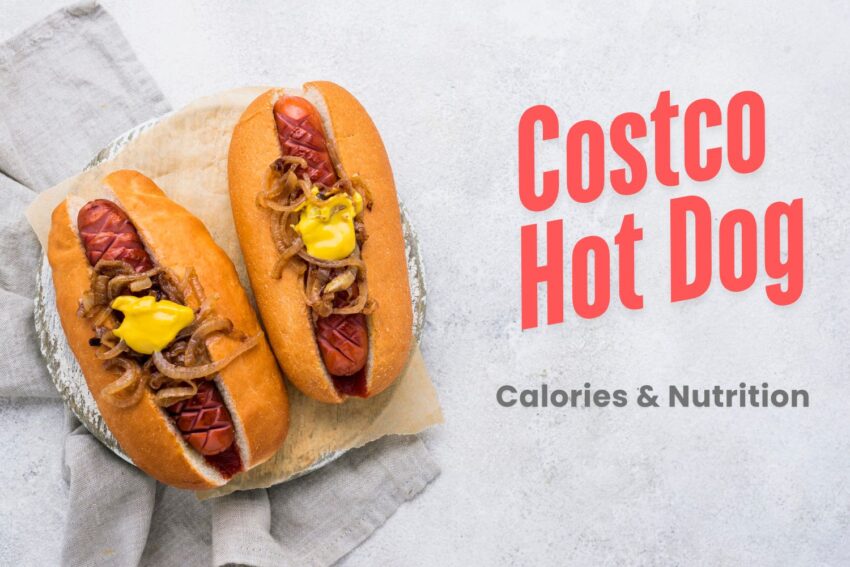The Costco hot dog and soda combo is a staple of the food court experience and a fan favorite for good reason. At just $1.50, this quarter-pound hot dog and drink pairing has remained unchanged in price since 1984, despite decades of inflation. For many shoppers, it’s a comforting indulgence and a symbol of unbeatable value.
But while your wallet benefits, your health might tell a different story. Whether you’re a devoted fan or simply curious about the nutrition facts behind this popular meal, it’s worth understanding how many calories you’re consuming, what those calories are made of, and what impact they may have on your health.
This article will explore the Costco hot dog’s calorie count, nutritional profile, health effects, and practical ways to enjoy it more mindfully.
What Science Says
1. Calories and Macronutrient Breakdown
Several nutrition databases provide consistent estimates for the Costco hot dog and bun:
-
CalorieKing reports that the hot dog and bun together provide approximately 570 calories, including 33 grams of fat, 46 grams of carbohydrates, and 24 grams of protein.
-
FatSecret lists a similar profile: 580 calories, 32 grams of fat, 46 grams of carbs, and 24 grams of protein.
-
MyNetDiary includes additional detail, indicating 12 grams of saturated fat, 2 grams of trans fat, and about 5 grams of sugar.
In terms of calorie distribution:
-
Fat: Roughly 32 to 33 grams, contributing more than half of the total calories
-
Carbohydrates: Approximately 46 grams, including sugars and minimal fiber
-
Protein: Around 24 grams, offering substantial satiety
2. Sodium Content
The sodium content is where things get more concerning. The hot dog and bun contain around 1,750 milligrams of sodium, which is about 73 to 78 percent of the recommended daily maximum of 2,300 milligrams, according to the American Heart Association.
For individuals with high blood pressure or cardiovascular risks, even one hot dog could be a sizable chunk of their daily allowance.
3. Drink and Topping Considerations
The $1.50 combo includes a 20-ounce soda, and depending on your drink of choice, the total calorie count could jump significantly:
-
Regular soda: Adds roughly 150 to 270 calories
-
Diet soda or water: Zero additional calories
Toppings like ketchup, mustard, relish, and onions typically add fewer than 50 calories total, but more indulgent extras like cheese or chili can raise the number dramatically.
Check here to view the PDF version of the Costco Hot Dog nutrition profile.
How It Affects the Body
Caloric Density and Satiety
At about 570 calories, the hot dog and bun alone make up nearly 30 percent of a standard 2,000-calorie diet. Thanks to its 24 grams of protein, this meal can be filling and temporarily satisfying. However, because it is high in saturated fat and sodium, regular consumption may contribute to health issues over time.
Also Read: Hacks for Managing Blood Sugar Spikes with Protein
Saturated Fat and Cardiovascular Risk
The saturated fat content in a Costco hot dog is approximately 12 grams, which is more than half of the daily limit recommended by health authorities. High intake of saturated fat is associated with elevated LDL (“bad”) cholesterol levels, which can increase the risk of heart disease and stroke.
Sodium and Blood Pressure
Sodium intake in the range of 1,750 milligrams in one meal may raise blood pressure, especially in salt-sensitive individuals. This can contribute to long-term cardiovascular complications, kidney strain, and water retention.
Processed Meats and Cancer Risk
The World Health Organization classifies processed meats like hot dogs as Group 1 carcinogens, meaning there is sufficient evidence that they can cause cancer in humans. Regular intake of processed meats has been linked to an increased risk of colorectal and stomach cancers.
The risk is considered dose-dependent, which means the more frequently you consume them, the higher the potential danger.
Practical Tips and Takeaways
If you love the Costco hot dog, the good news is that you don’t necessarily have to give it up entirely. Here are some practical ways to make this treat a smarter part of your diet:
-
Choose a diet drink or water
Opting for water or a zero-calorie soda keeps the combo closer to 570 calories, as opposed to 800 or more with sugary drinks. -
Be selective with toppings
Standard condiments are relatively harmless in small amounts, but extras like cheese sauce or chili can add unwanted fat and calories. -
Consider skipping the bun
The bun contributes roughly 160 calories and 40 grams of carbs. Removing it can significantly cut the total calorie load. -
Share or save half
Eating only half the hot dog or splitting it with a friend can turn a heavy snack into a more moderate indulgence. -
Balance your meals
If you know you’ll be having a hot dog for lunch, keep your breakfast and dinner lighter and more nutrient-dense. Focus on vegetables, lean protein, and whole grains. -
Stay active
Burning off 570 calories takes about 60 minutes of jogging or nearly two and a half hours of walking. Physical activity helps counterbalance occasional high-calorie meals. -
Limit frequency
Making the Costco hot dog a once-in-a-while treat rather than a regular part of your routine can help keep long-term health risks in check.
Risks and Side Effects
Like many fast food items, the Costco hot dog carries certain risks, especially if consumed frequently:
-
Elevated blood pressure due to high sodium intake
-
Increased cholesterol levels from saturated fat
-
Higher cancer risk from regular consumption of processed meats
-
Digestive issues such as bloating or acid reflux for sensitive individuals
-
Weight gain if caloric intake consistently exceeds energy needs
For those managing chronic conditions such as hypertension, heart disease, or kidney disorders, it’s especially important to monitor intake of sodium and saturated fat.
Healthier Alternatives at Costco
Although the food court menu is limited, some alternatives may be lower in calories or better balanced:
-
Chicken Caesar Salad (without dressing or croutons): More vegetables and protein, though sodium can still be high
-
Turkey and provolone sandwich (when available): Offers more fiber and nutrients but may be high in calories
-
Acai bowl or fruit smoothie: A lighter choice with some nutritional value, although sugar content can be high
At home, you can recreate a lighter version by using turkey or plant-based hot dogs, whole grain buns, and fresh vegetable toppings.
Conclusion and Doctor Advice
The Costco hot dog is a beloved treat with a loyal fanbase and an unbeatable price. While it offers plenty of protein and satisfies cravings, it also packs a heavy dose of sodium, saturated fat, and calories. For most healthy adults, enjoying one occasionally is not a problem. The key is moderation and balancing your overall diet and activity level.
If you have any pre-existing health conditions, particularly related to the heart, blood pressure, or kidneys, consult with your healthcare provider or a registered dietitian before making this a regular part of your diet. They can help you make the best choice based on your individual needs.
FAQs
How many calories are in just the hot dog without the bun?
A Costco hot dog without the bun contains 370 calories, according to MyFoodDiary. This calorie count is for the hot dog itself, without the bun or any toppings.
What contributes to the 580 to 850 calorie range listed on the menu?
The variance depends on drink choice and additional toppings. Regular soda adds up to 270 calories, pushing the total toward 850.
Are Costco hot dogs made from 100% beef?
Yes, Costco hot dogs sold in their food court are made with 100% beef. However, while the primary ingredient is beef, the hot dogs also contain other ingredients like spices, preservatives, and sodium nitrite. Costco also uses high-quality USDA choice beef, the second-highest grade.
Are they kosher?
No, Costco hot dogs are not kosher. Costco switched from kosher hot dogs to producing their own non-kosher Kirkland brand hot dogs in 2011.
Is it okay to eat Costco hot dogs regularly?
While fine on occasion, regular consumption may increase risks for high blood pressure, heart disease, and cancer due to high sodium and processed meat content. They are not a healthy choice to eat regularly, therefore, frequent consumption is not recommended.
This article is published by our independent team of health and wellness pundits that publish original and informative content to empower readers to take charge of their health and embark on a physically, mentally, and emotionally balanced lifestyle.




































